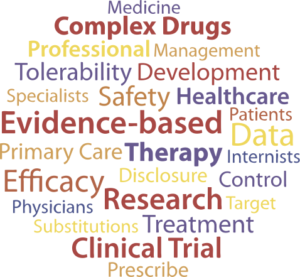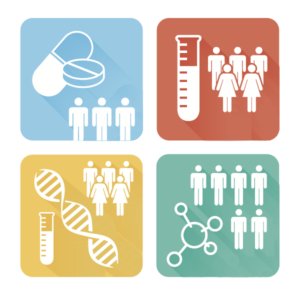Inside the Minds of Clinical Scientists: Why Choose BioPharma Services

The Role of Clinical Scientists at BioPharma:
Looking for answers to unresolved questions about human health, contributions to medical advancements, and spearheading innovative research? These are just “a few of the daily work tasks” of clinical scientists. In this exclusive interview, we sit down with four amazing individuals who have charted career paths in the field of clinical science. They all have different backgrounds, experience, and positions, but all together give an overview of the career path of a Clinical Scientist.
When searching for positions related to Clinical and Pharmacology Scientists, you may come across various job titles offered by different organizations. At BioPharma Services, our team includes Pharmacokinetics Scientists who specialize in studying and applying the principles of drug pharmacokinetics, while Clinical Pharmacology Scientists focus on drug pharmacodynamics. These two groups work collaboratively to assess and investigate the correlation between pharmacokinetics and pharmacodynamics (PK/PD) and interpret its significance in drug development.
Daily Tasks and Responsibilities:
Question: To provide a clearer perspective about clinical pharmacology for the audience, can you briefly describe your daily work?
Sofia and Jacinda: It’s not surprising that our daily work is quite similar to each other.
Sofia: On a given day, I could be working on a study design, developing a protocol and other study documents, and collaborating on the set-up of computerized assessments within my expertise. I also review and comment on the statistical analysis plan and study information updates. Upon study completion, I interpret the study results and write up the study report. As a Clinical Pharmacology Scientist, I also sometimes conduct training on study-specific procedures for operational teams.
Jacinda: While most of the time I work independently, I also closely collaborate with various departments and sponsors that are necessary to pave the study process and study conduct. Thus, planning meetings and calls are a must for a Clinical Pharmacology Scientist. After a trial is complete, I provide scientific advice toward the client’s drug development plan as needed. As a PK Scientist, I regularly work on PK modelling and simulations to provide valuable insights and recommendations to clients.
Sofia and Jacinda: Occasionally participating and showcasing our works in conferences is a part of our job as well.
John and Juan: In the managing position, the landscape of daily work broadened significantly beyond the original days of a scientist.
Juan: Overall, my role as the VP of Pharmacometrics combines scientific expertise, strategic decision-making, and leadership to drive the application of PK/PD work in our clinical trials, thereby contributing to the delivery of high-quality work to our clients. On a typical day, I oversee and lead the PK Scientists’ activities while engaging in multiple discussions with internal and external stakeholders. My primary responsibility is to ensure the seamless collaboration of a multi-functional team of skilled scientists specialized in pharmacokinetics and pharmacodynamics for early-phase clinical trials. Currently, I am working toward expanding our business in modelling and simulation services.
John: I spend most of my day supervising the activities and initiatives of the Scientific Affairs group, which encompasses Clinical Pharmacology, Pharmacokinetics, Medical Writing, Data Management, and Biostatistics. As part of the executive team, I participate in shaping the company’s direction. I also assist our business development group and engage in early discussions with potential sponsors to assure them of BioPharma’s robust scientific expertise for conducting their studies. Despite the crazy schedule, I still find the most fulfilling aspect of my daily work is contributing to study design and analysis. Undertaking research to comprehend new drugs and the indications our sponsors are exploring is always intriguing.
Qualities for Aspiring Clinical Scientists:
Question: Which three qualities do you consider the most important for individuals aspiring to join the Clinical Scientist career path?
All: A scientist’s mind!
Jacinda: While education and experience are crucial for the job, possessing a scientific mindset that encompasses the ability to scrutinize both intricate details and the broader perspective is equally essential for a scientist generally and a Clinical Pharmacology Scientist particularly. Creative thinking and the capacity to apply previous knowledge to novel situations are our best gears, as is the willingness to explore new concepts and ideas.
John: Totally! An analytical mind, able to look at any problem and identify solutions, is essential. Also, willingness to continually learn new concepts and venture beyond your expertise. Presently, I oversee departments in which I initially lacked experience (e.g., Data Management and Biostatistics) but “unless you try to do something beyond what you have already mastered, you will never grow.”
Sofia: Also, a mind that embraces an active passion for staying at the forefront of evolving research, technologies, and tools as they fuel our drive to push boundaries and enhance our approach to drug analysis.
Juan: A scientist’s mindset is accompanied by a strategic vision that enables you to foresee future challenges and opportunities, adapt to shifting priorities, and strive for success.
Jacinda: Communication skills are essential for us. We have the power to bridge the communication gap between scientific minds and individuals from diverse backgrounds. We convey complex scientific concepts to non-experts using simple language, while also articulating simple requirements into scientific language for experts in the field. This skill enables us to facilitate clear and productive interactions during trials. We are the “scientific translators.”
Sofia: Agree. This is a collaborative role where we work with both internal and external stakeholders. We build trust through professional communications and effective work.
John: As a manager, connecting with the team is very important for me. Being a leader is more about guiding than talking to people about what to do.
Juan: Additionally, a strong awareness of regulatory and industry aspects is crucial in this career path. In the pharmaceutical industry, regulatory compliance is crucial. It is essential to have a profound understanding of regulatory guidelines and requirements concerning clinical drug development. Keeping abreast of the evolving regulatory landscape and industry trends is vital to ensure the organization’s practices align with regulatory expectations.
Advice for Aspiring Clinical Pharmacology Scientists:
Question: Do you have any advice for people who are looking for opportunities in this field?
John: I attribute my career progression to good fortune. My first industry role was through a connection with a former master’s supervisor, my second job was secured via a previous boss, and my third was facilitated by a former colleague who introduced me to BioPharma. The significance of maintaining healthy professional relationships and making memorable contributions cannot be understated.
During interviews, I often look for a meaningful connection with the candidate. The key is authenticity in your CV and making it evident how you fit the job in question. A tailored cover letter, showcasing an understanding of the role and the company, can make a lasting impression. It’s vital to me that they exhibit as much enthusiasm for the role as I do for their potential addition to the company.
Juan: Here are some valuable pieces of advice to consider:
- Pursue Relevant Education and Training
- Develop Strong Analytical and Technical Skills
- Stay Updated with Advancements
- Gain Regulatory Knowledge
- Seek Job Postings and Build a Professional Network
- Gain Practical Experience
- Emphasize Transferable Skills in Interviews
Sofia: If you are currently a student, try getting involved in clinical research studies to gain hands-on experience. Enrolling in courses related to pharmacology and research methods in clinical studies, psychology, or medical science would be helpful. For a scientist position, suggest submitting a more detailed CV rather than a resume and including the names of your graduate supervisors – it’s a small world, and you never know when someone may recognize the name.
Jacinda: Seek out opportunities to attend workshops, training programs, and webinars to establish a rock-solid scientific foundation in PK. These resources could unravel the latest advancements in PK. Websites like Indeed and LinkedIn are good sources of job postings.
Building a successful career in the area of Clinical Pharmacology needs continuous learning, adaptability, and a passion for scientific discovery. Stay motivated, seek opportunities to expand your knowledge, and remain dedicated to making meaningful contributions to the field. It is this holistic nature of the journey that will create a unique expertise that sets you apart.
Meet the Experts:
- John Oldenhof, PhD., is the Executive VP of Scientific Affairs, with over 20 years of senior management experience in Phase I clinical pharmacology, product development, biostatistics, data management and regulatory and scientific affairs. His published work and experience include the development of novel methodologies, innovative study designs and direct collaboration with the US Food and Drug Administration (FDA) to advance human abuse potential studies and pharmacometrics analyses. Oldenhof holds an Adjunct Lecturer position in the Department of Pharmacology & Toxicology at the University of Toronto and is a parent member of the Genetic Epilepsy STXBP1 Disorder Scientific Advisory Board.
- Sofia Raitsin, PhD., is the Senior Clinical Pharmacology Scientist, who is an unparalleled problem solver and a seasoned researcher; she has emerged as a key figure in the field of clinical pharmacology. Armed with five years of industry experience in addition to preceding academic clinical research experience, Sofia’s work centers around deciphering the pharmacological properties of drugs and guiding their development from preclinical studies to human trials. Moreover, her insights into psychology have been crucial for the conducting of human abuse potential and psychedelics studies at BioPharma Services.
- Juan He, Msc., is the VP of Pharmacometrics, with a career spanning over two decades, Juan brings a wealth of knowledge and a strategic vision to the realm of pharmacometrics. Her expertise lies in employing mathematical modeling and simulation techniques to predict a drug’s PK behavior, optimize dosing, and comparative bioavailability, and enhance decision-making throughout the new and generic drug development process. Juan’s impressive track record has earned her a reputation as a trailblazer and a mentor in the pharmaceutical industry.
- Jacinda Kwok, MSc., is the Pharmacokinetics Scientist with a passion for precision and curiosity, she will make notable strides in the world of pharmacokinetics. With her strong background in pharmacology and diverse experience working on multiple therapeutic areas, Jacinda can provide thorough advice and recommendation from the PK aspects on specific study design as well as the overall drug-development plan.
BioPharma Services stands at the forefront of drug development, backed by a team of dedicated and experienced clinical scientists. Our experts not only bring their vast knowledge and expertise to the table but also a passion for innovation and discovery. For drug development sponsors, choosing BioPharma means partnering with a leadership team that’s deeply committed to advancing human health and ensuring the success of your drug development journey. Join us in making a difference in the world of medicine.



